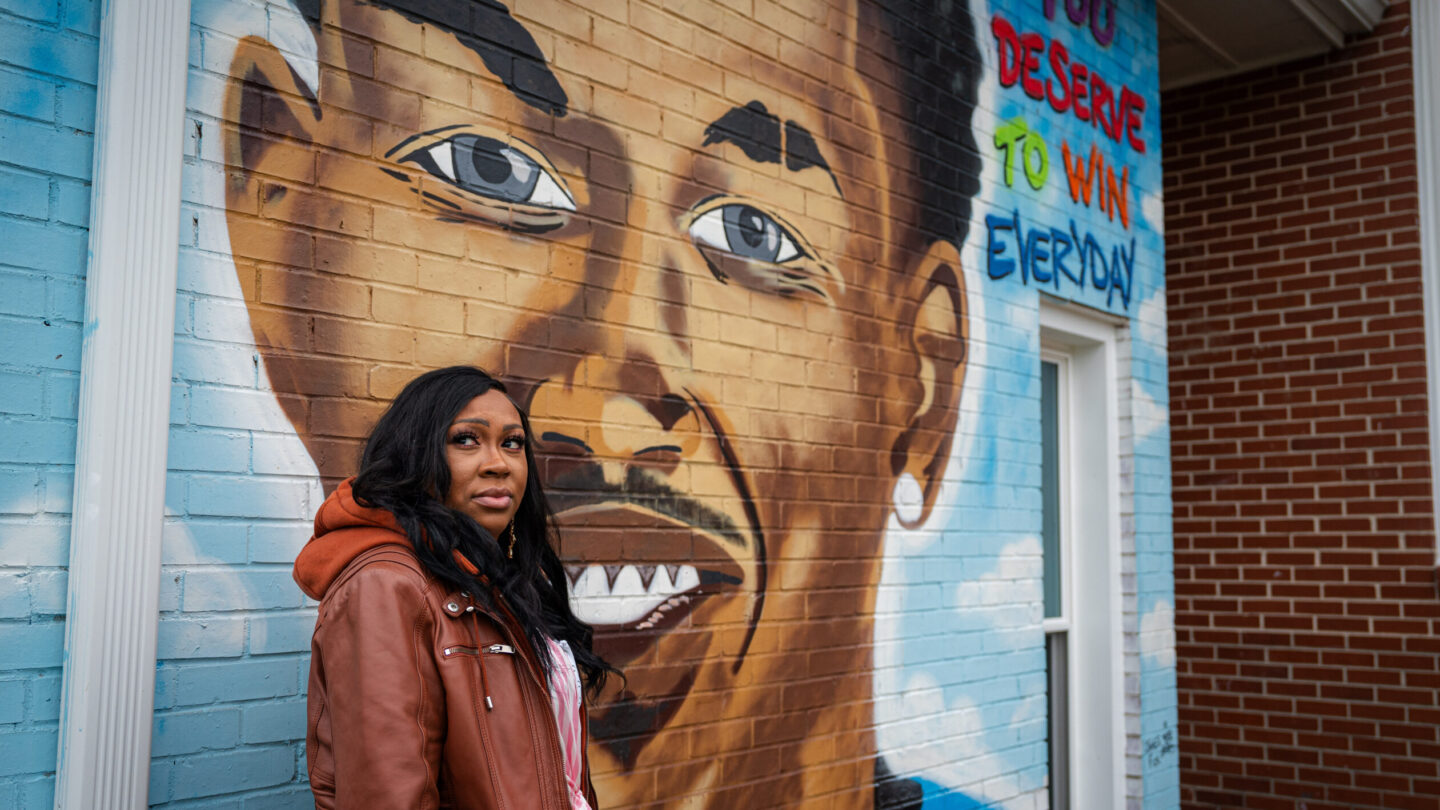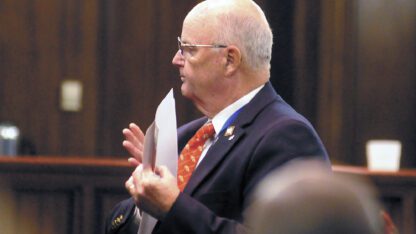A large mural of a man with an afro and a collection of colors like orange, blue and green painting his face covers the wall of a community center in Macon.
The Beyond Your Ordinary: Nygil M. Cullins Recovery Housing and Community Center is named after Mya Cullins’ son.
She said they envisioned the center together and were renovating the building before he was shot and killed by Atlanta police at a Buckhead restaurant in 2022. She now carries his legacy through her work in the community.
“As you can see, right now they’re hosting individual sessions, group sessions,” Mya Cullins said. “Those are individuals with a past history of addiction or mental health and they come in here every week and they meet with a licensed clinician.”
According to authorities, Cullins was acting unruly at the restaurant and later allegedly shot a security guard who was trying to take him outside before Atlanta police arrived and opened fire, killing the 22-year-old.
The Cullins family and other advocates dispute that account.
Georgia and Atlanta chapter NAACP President Gerald Griggs is one of a select few who have been allowed to watch the body camera footage in the nearly two years since Cullins’ death.
“Many times in these cases there’s an initial narrative that’s put out there from the perspective of law enforcement, but when you actually delve deep into the facts of the case, it is a different story,” Griggs said.
Based on the tape, Griggs said Cullins put his hands up in the air when he saw the police but that he was shot two separate times while he was on the ground. It’s unclear who fired first.
Griggs said Cullins suffered from at least 10 gunshot wounds.
The Georgia Bureau of Investigation said it completed its review of the case in June of last year.
WABE has filed an open records request for the footage, but it is in the hands of the Fulton County District Attorney’s Office.
Statewide, the last time there were fewer than a hundred police shootings in a year was in 2020, when 96 were reported to the GBI.
But in 2022, Cullins was one of a record 112 police shootings. An analysis by WABE found approximately 48% of those were fatal.
The GBI said the number of police shootings slightly fell to 103 last year, but the percentage of those who died stayed the same.
A majority of last year’s cases allegedly involved a suspect with a gun. At least a dozen of the fatal police shootings did not, including instances where an officer mistook a replica or air gun for a firearm.
Thaddeus Johnson, a senior fellow at the Council on Criminal Justice and a professor of criminology at Georgia State University, said Georgia is a microcosm of national trends post-pandemic.
He previously served a decade in law enforcement in Memphis, Tenn., where he trained other police officers in defensive tactics.
“A lot more people are carrying weapons,” Johnson said. “Georgia recently passed a gun law [Constitutional Carry Act], where basically if you have a pulse and you’re over a certain age, then you can carry a weapon. Tennessee has done it. And the one thing that I was worried about when these things started happening during the pandemic lockdown season was [that] every time an officer encounters a citizen it is a potentially armed encounter.
“That doesn’t mean that it’s necessarily going to be dangerous,” he continued, “but when you have weapons involved, things can get a little bit sticky and fuzzy when you’re dealing with high-stress situations.”
According to Johnson, the pandemic also caused many people to move to more suburban and rural areas, meaning police officers aren’t as familiar with the communities they serve as they may have been pre-pandemic.
Additionally, he said new officers are being hired to offset the hiring crisis that many in law enforcement blame on both the pandemic and criticism of police.
Johnson said another possible reason fatal police shootings continue to be so high is because police officers are trained to shoot center mass.
“It’s the largest body part,” Johnson said. “The problem with that is that you’re going to bleed out more and it also increases the opportunity for death, particularly if you’re in an area that doesn’t have quick access to paramedics or medical facility deserts. You see those types of things in a lot of urban areas as well. So, you kind of have all these things that are coming together.”
This is a list of officer-involved shootings that occurred in Georgia in 2023, according to the Georgia Bureau of Investigation. It includes the name of the person shot, the date of the incident and where it occurred. The GBI reported 103 such shootings in various jurisdictions throughout the state. (GBI/WABE)
WABE found that many of last year’s cases were in response to a mental or emotional crisis, like the one Cullins’ family says he was suffering.
In recent years, some law enforcement agencies have invested or partnered with mental health experts to respond during these tense situations.
But when Cullins was shot and killed by Atlanta police, the Policing Alternatives and Diversion Initiative, or PAD, had already expanded its 311 non-emergency services line across the city to help people avoid interactions with the police, and officers were still called to the scene.
Griggs said he thinks the problem is that the climate around policing has not changed since the protests in 2020 over the murder of George Floyd.
“I find it very difficult to believe that 103 shootings in Georgia are all justified,” Griggs said. “And you know, I’ve been practicing law long enough to know that it’s very difficult to justify a hundred shootings — some of which turn into killings — and say all of them were not violative of the law.”
Mya Cullins said the recent increase in deadly police shooting investigations is leaving families with more questions than answers. In 2022, she said she was told the Fulton County District Attorney’s Office was a year behind on such investigations.
“I have about 30 mothers now that I talked to on a regular basis that’s crying, where the same thing happened,” she said. “‘I don’t have any answers. I’m going in circles and nobody’s telling me nothing. I met with the NAACP. They’re trying to fight, but nobody’s giving them answers.’ This is the thing that people deal with. Where’s the timeline? What statutes are going to be implemented?”
Meanwhile, some families who lost a loved one in a police shooting last year have started fundraisers or petitions to try to raise awareness about their case, like Lenette Millard.
Her 20-year-old son, Emmanuel Millard, was the 78th officer-involved shooting that the GBI was asked to investigate last year.
According to the GBI, Woodstock police tried to conduct a traffic stop, but Millard allegedly led them on a vehicle pursuit into Cobb County. Millard later crashed and was boxed in his car after police conducted a PIT maneuver.
“As officers attempted to remove Millard from the car, an officer fired once, hitting Millard,” the GBI states.
Millard was transported to a local hospital to be treated for his injuries, but he died two days later on Oct. 14.
“My family is struggling to come to terms with this profound loss, and the lack of transparency surrounding Emmanuel’s tragic death only adds to our pain,” his mom wrote on GoFundMe. “The police department is wrong. Yet, they have provided us with no information, no closure and no justice.”
The Woodstock Police Department said it could not release the bodycam footage from the incident because the GBI’s investigation is pending. However, it confirmed that the officer who shot Millard resigned from the department on Oct. 19.
Police agencies typically ask the GBI to conduct an independent investigation anytime an officer fires a gun, but they are not required to, making it difficult to really know how many police shootings happen every year.
The GBI also only assesses whether officers acted lawfully and then sends its findings to the local district attorney’s office for possible charges.
GBI spokesperson Nelly Miles said the agency does analyze trends in the police shootings it’s called to investigate, but that information is not available to the public.
“It’s law enforcement sensitive,” Miles said.
Advocates say more transparency is needed.
While the state does not have a mandated database of police and citizen encounters, President Joe Biden has made an effort to change that by signing an executive order in 2022 that establishes a national database to track misconduct by federal law enforcement officers.
So far, it is not open to the public.
update – submit










